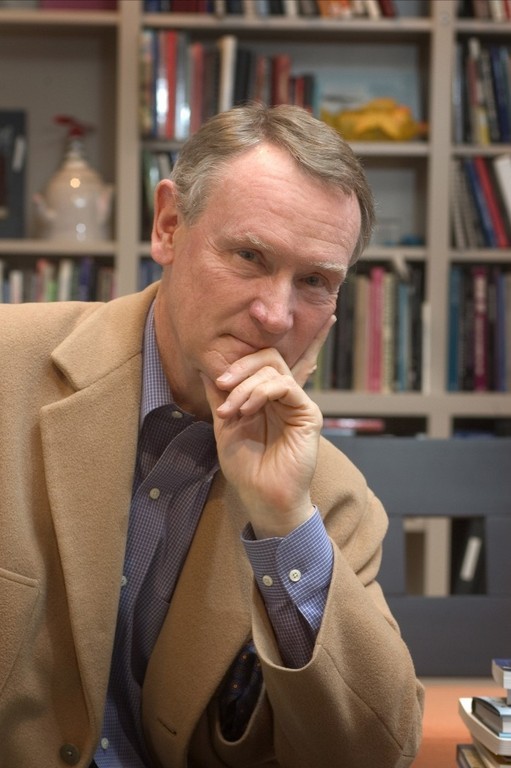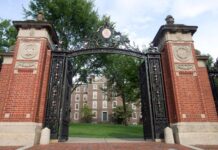
Roger Mandle
POSITION: President, Rhode Island School of Design
BACKGROUND: Before coming to RISD in 1993, Mandle was deputy director of the National Gallery of Art in Washington, D.C., a position he held for five years. Prior to that, he was the director of The Toledo Museum of Art in Ohio. Mandle started his career as an associate director of the Minneapolis Institute of Arts in 1967.
EDUCATION: B.A. in studio art/art history, 1963, Williams College, Williamstown, Mass.; M.A. in museum training, 1967, New York University; Ph.D. in art history, 2002, Case Western Reserve University, Ohio
RESIDENCE: Providence
AGE: 65
In his nearly 14 years as president of Rhode Island School of Design, Roger Mandle has grown the college’s endowment from $67 million to $340 million, grown the faculty by more than 50 percent, expanded RISD’s facilities by 50 percent, and led the school’s first comprehensive capital campaign, raising $105 million for scholarships, facilities, technology and programs.
Now Mandle, RISD’s longest-serving president, says he wants to explore “other avenues of professional opportunity.” On Feb. 2, he announced he does not plan to renew his contract when it expires in July 2008.
PBN: What are your plans after RISD?
MANDLE: I don’t really have specific plans. I have targets of opportunity or directions I would go … but I am sort of leaving myself open to see what happens. I have a broad variety of interests … in the arts and design, education, public service. … It might be here in this region or it might be somewhere else.
PBN: Out of all you’ve accomplished during that past 14 years, what’s most important to you?
MANDLE: Creating a broad sense of purpose about this place and being able to elevate that purpose to an international scale. … It means linking together the alumni, and the parents and the students and the faculty and the administrative staff. … I think generally, if you were to ask anybody here, they would define this place in roughly the same way, … as a place that has a very high sense of purpose about the arts and design, and about education in the world at large, which is grounded in the acquisition of skill, but is reinforced by the power of the humanities to broaden our vision about what the world is all about and what it needs from artists and designers.
PBN: What have you done to raise international awareness of RISD?
MANDLE: We have linked ourselves with 60 or 70 institutions around the country, around the world. They’re as broad-ranging as from Scotland to Singapore to China. … I think a school like RISD … needs to have people coming from all over the world to Providence, and then we send them back out … so they get to apply the large ideas and the skills they’re learning here.
PBN: You have brought RISD more into the community through sponsored research, collaborations and entities such as the Center for Design and Business. Is that something you expect to continue with your successor?
MANDLE: I can’t imagine that the community wouldn’t demand that the new president have an equally strong commitment to being out there in the world at large and in the Providence region working with the economic development issues, working with the education issues.
PBN: You have worked to make RISD a leader in promoting a fertile climate for design-related businesses. How successful do you think that effort has been?
MANDLE: I think the Center for Design and Business has had a lot of success in certain, narrow ways. It certainly did help raise the visibility of design as an asset of business. And it also has had success, along with our continuing education program, training artists to be better business people. … And now during the creativity revolution or … the conceptual age, we are arriving at a new place where the arts and design are even more important than they were then.
PBN: What is it that startup design- and arts-related businesses need from this region?
MANDLE: They could benefit from the same kind of tax advantages that would suit small businesses of any kind. … They also could benefit from greater attention from RISD. We hope the Center for Design and Business being retooled will be able to do that. … I think we need to plan more regionally. We need to come up with regional tax incentives.
… Let’s get those governors of the states to come up with a regional economic policy that will just knock the socks off the Southwest or California.
PBN: What would be the benefit?
MANDLE: The economy in New England is extremely fragile. We are still draining away the leavings of the manufacturing businesses that were the backbone of this place. … What are we doing to replace it?
Florida, for example, decided they wanted to link their universities to the biotech industry. So instead of spending their tobacco refund checks on balancing their annual budget, they put that money into research. … Now they’re going to become one of the nation’s largest progenitors of biotechnical research.
PBN: What do you think is the single biggest asset of the state that is the least recognized?
MANDLE: Our children … why aren’t we doing more with our public schools to improve their education so that they will find jobs here and create companies and are able to be accepted at Brown and RISD? We aren’t educating our children to be able to get into our schools.
PBN: Will student aid, which in-creased by 109 percent to $10.7 million during your tenure, continue to be a priority after your departure?
MANDLE: It’s going to continue to be a priority here forever. … The cost of higher education now is so great that I think we’re all going to lose good, talented students if we aren’t doing more in the way of providing financial aid support. But given the specific dynamics of our own budget and agenda, those increases in financial aid cannot come from our operating budget. They have to come from private contributions.












